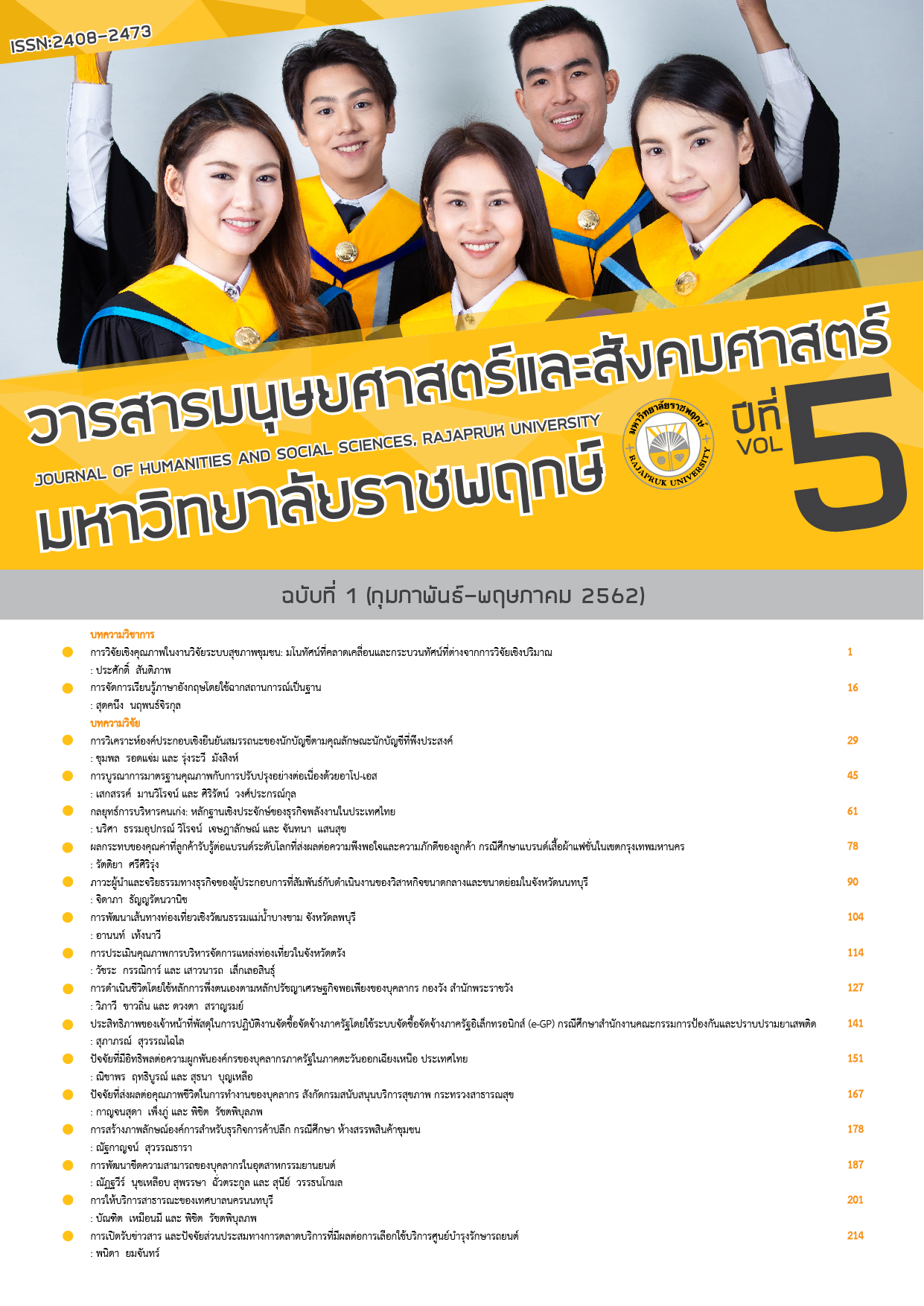English Instructional Design Using Scenario-Based Learning
Main Article Content
Abstract
The aim of the article was to propose the English instructional design using scenario-based learning. This instructional design consists of learning objectives, scenario creation, instructional procedures which include 1) facing a scenario; 2) tackling a problem; and 3) learning independently, teacher’s roles, learner’s roles, and learning outcomes. The English instructional design using scenario-based learning is suitable for undergraduate students. It enhances all four English language skills by learning in near-world situations. Learners acknowledge the relevance of the use of English language in the workplace. The English instructional design using scenario-based learning develops teamwork and collaboration skills, decision-making skills and independent learning skills which are desirable characteristics for learners in the 21st century. It also prepares graduates to be ready to enter the world of work.
Article Details
References
วรวรรธน์ ศรียาภัย และคณะ. (2553). ความต้องการคุณลักษณะบัณฑิตทางภาษาและการสื่อสารของสถานประกอบการ. วารสารช่อพะยอม, 21: 36 - 50.
Brush, T.A., & Saye, J.W. (2002). A summary of research exploring hard and soft scaffolding for teachers and students using a multimedia supported learning environment. The Journal of Interactive Online Learning, 1(2): 2 - 12.
Education First. (2017). EF English Proficiency Index. Retrieved on June 15th, 2018, from www.ef.com/epi
Educational Testing Service. (2018). 2017 TOEIC Report on Test Takers Worldwide. Retrieved on June 15th, 2018, from http://www.etsglobal.org/Global/Eng/content/ download/ 23691/378432/version/1/file/LR+2017+Worldwide+Report.pdf
Errington, E.P. (2010). Preparing graduates for the professions using scenario-based learning. Brisbane: Post Pressed.
Fisher, D., & Frey, N. (2014). Better learning through structured teaching: A framework for the gradual release of responsibility. 2nd ed. Alexandria, Virginia: Association of Supervision and Curriculum Development.
Frey, N., & Fisher, D. (2009). The release of learning. Principle Leadership, February 2009: 18 - 22.
Global English. (2010). The globalization of English report: Globalization accelerates need for business English communication skills. Retrieved on September 13th, 2017, from http://static.globalenglish.com/files/case_studies/ GlobEng_ ResearchSt_GlobEngRep_EN-US_FINAL.pdf
Hammond, J., & Gibbons, P. (2001). What is scaffolding? In J. Hammond (Ed.), Scaffolding: Teaching and learning in language and literacy education (pp. 1 - 14). New Town, NSW: Primary English Teaching Association.
Heinich, R., et al. (1996). Instructional media and technologies for learning. Englewood Cliffs, NJ: Merrill.
Kindley, R.W. (2002). Scenario-based e-learning: A step beyond traditional e-learning. Retrieved on March 18th, 2016, from http://www.learningcircuits.com/2002/ may2002/kindley.html
McKinsey Global Institute. (2017). A future that works: Automation, employment, and productivity. Retrieved on June 2nd, 2017, from www.mckinsey.com/MGI-A-future-that-works-Full-report%20(1).pdf
Mery, Y., & Blakiston, R. (2010). Scenario-based e-learning: Putting the student in the driver’s seat. 26th Annual Conference on Distance Teaching and Learning. August 4 - 6, 2010. Wisconsin: University of Wisconsin.
Sinlarat, P. (2015). Future teacher’s roles: Preparing students to teach themselves. Journal of Social Sciences and Humanities, Rajapruk University, 1(1): 1 - 8. Retrieved on June 25th, 2018, from https://www.tci-thaijo.org/index.php/rpu/article/ view/112118/87382 (in Thai)
Sriyabhaya, W., et al. (2010). The Needs of Entrepreneurs to Characteristics of Graduates in Language and Communication. Chophayom Journal, 21: 36 - 50. (in Thai)


